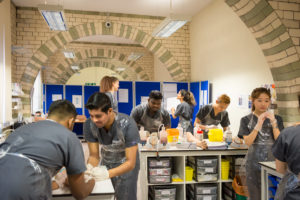How you'll learn
The programme is primarily delivered online, with one on-campus teaching week per semester.
Online study will comprise a mix of e-lectures, live seminars, independent work and assessment activity. There is typically around three hours of e-lectures per week which includes watching videos and completing directed tasks. Online seminars are learner-led discussions, typically for two hours per week. Live seminars will be scheduled at the same times each week to help you plan part-time study around your other commitments.
The on-campus weeks are a highlight of the programme, bringing learners together for an intensive week of practical, interactive and collaborative sessions. These will involve dissections and cadaveric examinations of different specimens in small groups. Teaching is led by expert anatomists and clinicians and includes opportunities for peer-to-peer teaching. Educational workshops, assessment activities and networking events complete the timetable for each of the on-campus weeks.
How you're assessed
You’ll be assessed through a combination of written assignments, presentations, spotter-style exams, self-reflection, and the creation of educational resources.
Spotter-style exams are an authentic and traditional assessment that enable you to demonstrate expertise in anatomy and its application to different scenarios.
The range of assessments are designed to build confidence, digital fluency and communication skills.
Liverpool Hallmarks
We have a distinctive approach to education, the Liverpool Curriculum Framework, which focuses on research-connected teaching, active learning, and authentic assessment to ensure our students graduate as digitally fluent and confident global citizens.
The Liverpool Curriculum framework sets out our distinctive approach to education. Our teaching staff support our students to develop academic knowledge, skills, and understanding alongside our graduate attributes:
- Digital fluency
- Confidence
- Global citizenship
Our curriculum is characterised by the three Liverpool Hallmarks:
- Research-connected teaching
- Active learning
- Authentic assessment
All this is underpinned by our core value of inclusivity and commitment to providing a curriculum that is accessible to all students.









